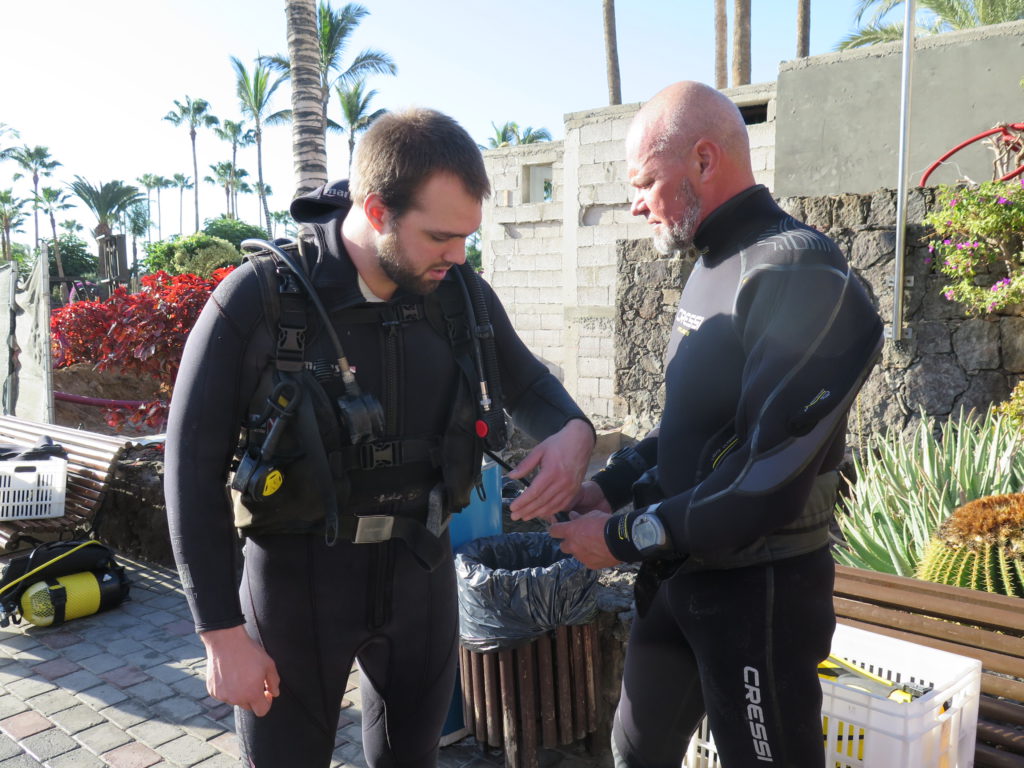Dive Guide and Dive Master – Unveiling the ins and outs.
Becoming a Dive Guide or Dive master is an exhilarating experience. It allows you to explore the breathtaking underwater world while sharing your passion with others. While many articles promote the benefits of undertaking a dive master course, our focus here is to provide a comprehensive understanding of the content and responsibilities associated with being a dive guide. This article aims to portray a realistic picture of the role and attract readers who genuinely desire to pursue this career path.
Understanding the differences
People often mix the terms dive guide and dive master but there are important differences between both. A dive guide is very clear. Your role is to act as a guide for certified divers. You can do this both as a volunteer or as a paid activity. A dive master is a dive guide that is trained to work as an assistant for instructors. A dive master can fulfil all the tasks of a dive guide but can assist in courses. The basic training for both roles is identical as are the responsibilities attached to the different roles.
Role and responsibilities af a dive guide
Being knowledgeable
Becoming a proficient dive guide requires extensive knowledge in various areas. In your role, divers consider you the expert that can feed them lots of information. From marine life identification to understanding diving techniques, guiding protocols, and emergency procedures, a dive guide must possess a solid foundation of theoretical knowledge. Often forgotten is the mandatory understanding of the legal regulations applicable in your area. Building this knowledge will never stop. Your dive guide training provides you the basic knowledge, but you must be triggered to deepen this knowledge after you certify. Once working as a dive guide or dive master, you will need to know the local marine life, fine tune your theoretical knowledge to local working habits, rules and regulations.
Being the tour guide
The role of a guide entails not only guiding divers but also ensuring their safety throughout the entire diving experience. Dive guides are entrusted with the task of planning and leading dives, assessing conditions, and mitigating potential risks.
Being confident about your own abilities and capabilities is key when taking responsibility over the safety of a group. Becoming a dive guide does not happen over-night. It requires building experience in various conditions and environments. Your training is building on top of these capabilities. Divers are often surprised by the difference in “dive adventure” after becoming a Dive Guide. Once you are certified you understand the seriousness that comes with your role and the level of responsibility you undertake.
Being the trusted assistant
The role of a dive master entails mainly assisting instructors in the education of divers. When teaching larger groups or very specialised courses, instructors require the help of a trusted assistant. The preparation of courses, participating in the course briefing, assisting students to complete or practice exercises and helping to warrant the safety during courses are only a fraction of the responsibilities. Be aware, the trust between an instructor and an assistant is not granted easily. Being confident in your abilities and possibilities as well as a good collaboration in the “teaching team” are mandatory to conduct courses in a fun but safe way.
Being the confidant
A significant aspect of being a guide lies in building connections with divers of diverse backgrounds and experience levels. Understanding the importance of effective communication and fostering a welcoming atmosphere is essential for facilitating an enjoyable and memorable experience. Assessing the divers helps interacting with and building the group you will guide in the dive adventure. Interacting and socializing with your divers is a natural behaviour. Your role of a dive guide as a mentor and advisor does add value to your divers’ dive experience.
Being an environmental steward
Dive guides play a vital role in promoting marine conservation and responsible diving practices. Educating divers about the fragility of marine ecosystems, the impacts of human activities, and the importance of sustainable diving is a fundamental duty. Your behaviour and guidance have a positive impact on the environment!
Being ready for the next step
A dive guide’s journey does not end with obtaining a certification. It is a continuous process of growth and improvement. Through building professional experience and advanced training, specialization, and career progression within the dive industry you are ready for a long-term professional development and diversification of skills.
Your dive master training
The diving industry offers lots of different tracks to become a dive guide. The format of your training will determine what type of guide you will become.
Zero-to-hero
It must be clear a fast-track training, often referred to as a “zero to hero”, focusses on a predefined training plan set out by the diving association. Within those programs you perform skills in such way your instructor can safely tick a completion box. The short training period leaves little room for practice, building experience or even rehearsing.
Intensive training program
In an intensive training program, the focus is building an in-depth knowledge and experience in all the aspects of the role. Each topic is separately trained, evaluated and rehearsed. During the training you are faced with more complex scenarios that bring all the building blocks together.
The focus of the training will largely depend on who is the organizing party. Local dive clubs mainly focuss on training dive guides and dive masters that can assist in the club organisation. Commercial dive centres will include training in more intensive operations that include daily diving combined with other activities such as training courses and snorkelling.
Both the zero-to-hero and the intensive training programs qualify you as certified dive guides. The recognition in the diving industry is equal. The question you need to answer is what training program gives you the ammunition ready to accept and handle the responsibilities of a dive guide. therefor a lot depends on your experience and confidence prior to entering the education.
Conclusion
Becoming a dive guide is an exhilarating and fulfilling career choice, but it requires dedication, responsibility, and a genuine passion for the underwater realm. This article aimed to delve into the content and responsibilities associated with this role, providing readers with a well-rounded understanding of what it truly means to be a dive guide. By presenting both the adventure and the challenges, we hope to attract readers who are ready to dive in, headfirst, into this exciting profession.



